Related Research Articles

Ayurveda is an alternative medicine system with historical roots in the Indian subcontinent. It is heavily practiced in India and Nepal, where around 80% of the population report using Ayurveda. The theory and practice of Ayurveda is pseudoscientific.

Deepak Chopra is an Indian-American author and alternative medicine advocate. A prominent figure in the New Age movement, his books and videos have made him one of the best-known and wealthiest figures in alternative medicine. His discussions of quantum healing have been characterised as technobabble – "incoherent babbling strewn with scientific terms" which drives those who actually understand physics "crazy" and as "redefining Wrong".

Sivananda Saraswati was a yoga guru, a Hindu spiritual teacher, and a proponent of Vedanta. Sivananda was born in Pattamadai, in the Tirunelveli district of Tamil Nadu, and was named Kuppuswami. He studied medicine and served in British Malaya as a physician for several years before taking up monasticism.
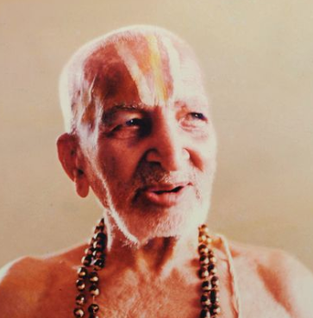
Tirumalai Krishnamacharya was an Indian yoga teacher, ayurvedic healer and scholar. He is seen as one of the most important gurus of modern yoga, and is often called "Father of Modern Yoga" for his wide influence on the development of postural yoga. Like earlier pioneers influenced by physical culture such as Yogendra and Kuvalayananda, he contributed to the revival of hatha yoga.
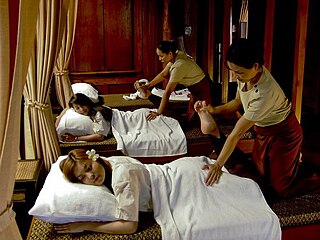
Thai massage or Thai yoga massage is a traditional therapy combining acupressure, Indian Ayurvedic principles, and assisted yoga postures. The idea of Sen-lines alias energy-lines was first used as "Thai yoga massage". These are similar to nadis as per the philosophy of yoga by Gorakhnath.

Chitrakoot is a pilgrimage centre and a nagar panchayat in the Satna district in the state of Madhya Pradesh, India. Connected to the Indian epic Ramayana, it is a place of religious, cultural, historical and archaeological importance, situated in the Baghelkhand region. It borders the Chitrakoot district in Uttar Pradesh, whose headquarters Chitrakoot Dham is located nearby. The city lies in the historical Chitrakoot region, which is divided between the present-day Indian states of Uttar Pradesh and Madhya Pradesh. It is known for a number of temples and sites mentioned in Hindu scriptures.

Dosha is a central term in Ayurveda originating from Sanskrit, which can be translated as "that which can cause problems", and which refers to three categories or types of substances that are believed to be present conceptually in a person's body and mind. These Dosha are assigned specific qualities and functions. These qualities and functions are affected by external and internal stimuli received by the body. Beginning with twentieth-century Ayurvedic literature, the "three-dosha theory" has described how the quantities and qualities of three fundamental types of substances called wind, bile, and phlegm fluctuate in the body according to the seasons, time of day, process of digestion, and several other factors and thereby determine changing conditions of growth, aging, health, and disease.
Paṇḍita, a Sanskrit word meaning learned master, may refer to:

Vasishta Yoga Samhita is a historically popular and influential syncretic philosophical text of Hinduism, dated to the 6th CE or 7th CE — 14th CE or 15th CE. It is attributed to Maharishi Valmiki, but the real author is unknown. The complete text contains over 29,000 verses. The short version of the text is called Laghu yogavāsiṣṭham and contains 6,000 verses.

Raghavendra Swami of Malladihalli (1890–1996), popularly known as ತಿರುಕ Tiruka ("beggar"), was the founder of Anatha Sevashrama Trust, Malladihalli. He taught yoga from his base as Malladihalli near Holalkere in Chitradurga district, a village in Karnataka, India.
Bachelor of Ayurvedic Medicine and Surgery (B.A.M.S.) is a professional degree focused on Ayurveda offered in India, Nepal, Bangladesh, and Sri Lanka.
The Ministry of Ayush, a ministry of the Government of India, is responsible for developing education, research and propagation of traditional medicine systems in India. Ayush is a name devised from the names of the alternative healthcare systems covered by the ministry: Ayurveda, Yoga & Naturopathy, Unani, Siddha, Sowa Rigpa, and Homeopathy.
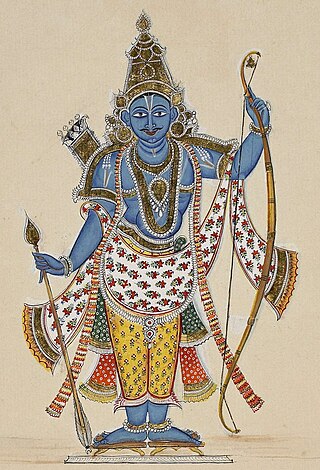
Rama is a major deity in Hinduism. He is the seventh and one of the most popular avatars of Vishnu. In Rama-centric traditions of Hinduism, he is considered the Supreme Being.
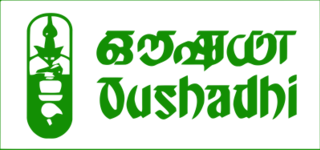
Oushadhi or Pharmaceutical Corporation Kerala Ltd is an Ayurvedic medicine manufacturing company situated in Kuttanellur, in Thrissur City of Kerala state. It is a fully Government of Kerala owned company and produces around 450 ayurvedic formulations.
Nancy Lonsdorf is an American author and medical doctor who practices Maharishi Ayurveda. She received her training at Johns Hopkins School of Medicine and studied Ayurveda in Europe and India, and is the author of several books on the subject.
Krishna Chandra Chunekar was an Indian ayurvedic practitioner and writer, known for the books he published, especially the translation of Vedic literature on herbal pharmacopeia. The Government of India awarded him, in 2013, the Padma Shri in medicine, the fourth highest civilian award, for his contributions.
Paneenazhikath Narayana Vasudeva Kurup was an Indian Ayurvedic practitioner, researcher, writer and the founder director of the Central Council for Research in Homoeopathy (CCRIMH). He is a former vice chancellor of the Gujarat Ayurved University, Jamnagar and a former advisor of the Indian Systems of Medicine and Homoeopathy (ISM&H) of the Ministry of Health and Family Welfare. He has published several articles and a book, A Handbook on Indian Medicinal Plants, on the traditional Indian medicine system, The Government of India awarded him the fourth highest civilian honour of the Padma Shri, in 2005, for his contributions to Indian medicine.
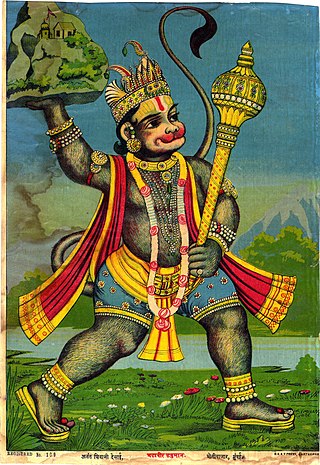
Sanjivani or the Mrtasanjivani is a medicinal herb featured in the Hindu epic Ramayana.

Shri Haridas Shastri (1918-2013) was an Indian Gaudiya Vaisnava scholar and practitioner. A prolific Sanskrit scholar, he wrote more than a sixty books, including translations from the Sanskrit of several Gauḍīya books and his own commentaries on them. His original works include the highly regarded book, the Vedānta-darśanam bhāgavata bhāṣyopetam, his translation-cum-commentaries of the Sat Sandarbhas, and his transliterations of Śrī-caitanya-bhāgavata, Śrī-caitanya-caritāmṛta and Śrī-caitanya-maṅgala. Jonathan Edelmann at the University of Florida has called Śāstrī "arguably the most prolific and well-educated Gauḍīya Vaiṣṇava “insider” scholar of the twentieth century" and "a voice distinct from the more well known Gaudīya-Maṭha and ISKCON". Among his disciples is the noted Gauḍīya scholar and practitioner, Dr. Satyanarayana Dasa.

Institute of Teaching and Research in Ayurveda (ITRA) Jamnagar, Gujarat, India which was founded in 1967. It has a joint campus with, an Institute of National Importance, established in 2020.
References
- Durga Prasad, History of Andhras, Guntur, 1988, page no - 270.